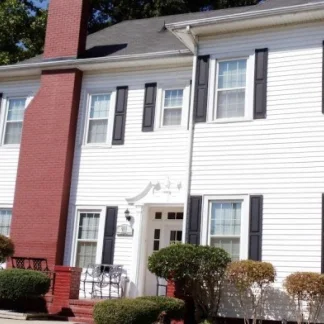Hendersons Fencing
Hendersons Fencing is a private rehab located in Gastonia, North Carolina. Hende...
Flynn Fellowship Home offers inpatient treatment for individuals with alcohol and/or substance addiction. The program includes halfway housing services, individual counseling, group therapy and more. Flynn Fellowship Home is located at Gastonia, North Carolina.
Contact us for more information: (704) 865-9395

Connect with Flynn Fellowship Home by calling their admissions team directly.
(704) 865-9395 Website Get DirectionsGroup therapy is any therapeutic work that happens in a group (not one-on-one). There are a number of different group therapy modalities, including support groups, experiential therapy, psycho-education, and more. Group therapy involves treatment as well as processing interaction between group members.
In individual therapy, a patient meets one-on-one with a trained psychologist or counselor. Therapy is a pivotal part of effective substance abuse treatment, as it often covers root causes of addiction, including challenges faced by the patient in their social, family, and work/school life.
Motivational Interviewing (MI) is a clinical approach to helping people with substance abuse issues and other conditions shift behavior in positive ways. It is more goal-oriented than traditional psychotherapy, as MI counselors directly attempt to get clients to consider making behavioral change (rather than wait for them to come to conclusions themselves). Its primary purpose is to resolve ambivalence and help clients become able to make healthy choices freely.
In individual therapy, a patient meets one-on-one with a trained psychologist or counselor. Therapy is a pivotal part of effective substance abuse treatment, as it often covers root causes of addiction, including challenges faced by the patient in their social, family, and work/school life.
Motivational Interviewing (MI) is a clinical approach to helping people with substance abuse issues and other conditions shift behavior in positive ways. It is more goal-oriented than traditional psychotherapy, as MI counselors directly attempt to get clients to consider making behavioral change (rather than wait for them to come to conclusions themselves). Its primary purpose is to resolve ambivalence and help clients become able to make healthy choices freely.
Motivational Interviewing (MI) is a clinical approach to helping people with substance abuse issues and other conditions shift behavior in positive ways. It is more goal-oriented than traditional psychotherapy, as MI counselors directly attempt to get clients to consider making behavioral change (rather than wait for them to come to conclusions themselves). Its primary purpose is to resolve ambivalence and help clients become able to make healthy choices freely.
Hendersons Fencing is a private rehab located in Gastonia, North Carolina. Hende...
Alexander Youth Network - Beacon Hall Day Treatment Center, located in Dallas, N...
Alternative Community Penalties Program is a private rehab located in Gastonia, ...
Freedom Detox is one of the only free standing addiction treatment centers in No...